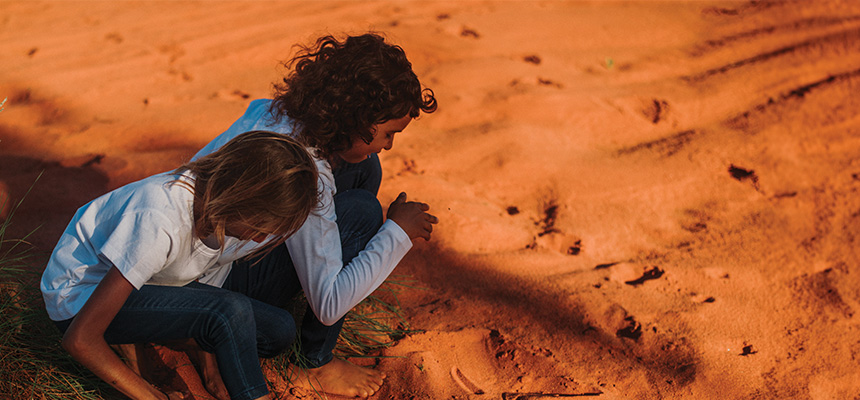
The saying goes that there’s a solution for every complex problem: simple, quick and wrong.
Aboriginal families and communities have endured the imposition of countless ‘solutions’ and had to live with the consequences of these ineffective initiatives. Those consequence are sadly evident in the unrelenting gap in outcomes for Aboriginal kids, compared with other Australian children.
To enable change, we have to do things differently.
That’s the essence of the Journey Together Initiative, an ambitious five-year research collaboration that sets out to unpack the complexity of how we – our systems and services – have to transform to better respond to the needs of Aboriginal families to grow up healthy kids.
Supported by BHP through generous funding to Telethon, at its core is a firm commitment to Aboriginal leadership, culture and community. It’s an important difference.
Leading the science is the Institute’s Professor Alex Brown, an internationally recognised Aboriginal clinician and researcher. “This is a long way from your traditional research approach, and that’s why we will get different answers,” Professor Brown said.
“In Journey Together we’ve worked with community and services to understand their priorities, support programs that respond to those needs, and embed our research mechanisms into those programs – usually it’s the other way round.”
The Journey Together Initiative has reached a major milestone with priority projects led by Aboriginal community-controlled organisations under way in all three sites – Port Hedland, Newman and Perth.
In Port Hedland, the Kumaparniku Wraparound Service through Julyardi Aboriginal Corporation is supporting young families with very high needs, many of whom have experienced high levels of trauma.
Puntukurnu Aboriginal Medical Service in Newman is running a project focused on perinatal and early child development, with better support in pregnancy and early life.
In Perth, Derbarl Yerrigan Health Service is developing a new paediatric and child development model of clinical care that takes a holistic, family-centred approach embedded in primary healthcare.
In development are projects with Wirraka Maya Health Services that will focus on teens and mental health, and with Moort Dandjoo Kaadajini’s Early Learning Program.
By the end of 2023, a targeted round of comprehensive social, cultural and medical needs assessments will be under way.
Add to this the updating and relinking of the ground-breaking WA Aboriginal Child Health Survey and you have an unprecedented depth of data.
“It’s the triangulation of all these varied experiences, environments and data that will provide a new level of understanding and the opportunity to co-design tailored responses according to need and context,” Professor Brown said.
That’s what has the Institute’s Director of First Nations Strategy and Leadership, Associate Professor Glenn Pearson, really excited.
Every child, every family, every community has its strengths and challenges. Journey Together is not about a one-size-fits-all solution, but a deep understanding of the elements of what it takes for Aboriginal kids and families to thrive. That’s powerful for community, for services and policy makers.
“These community-led projects are responding right now to community priorities and that has real value. By pulling all the different threads together, we will get insights at a whole new level, and I can’t wait to see where this journey takes us.”
Cultural leadership a guiding light
The Pilbara is a land of extremes.
The region’s vast resource wealth is the backbone of our nation’s economy, but Aboriginal children living in the Pilbara face significant health and wellbeing challenges driven by dispossession, poverty and remoteness.
It’s an everyday challenge that deeply troubles the Elders on the Hedland Aboriginal Strong Leaders group (HASL), which provides cultural advice and guidance to the vital work of Journey Together in Port Hedland.
It was their leadership that led to the establishment of the Kumaparinku Service, the priority project run by Julyardi Aboriginal Corporation that delivers wraparound support to families that are most in need.
“The word Kumaparinku means we’re all coming together as one, supporting and looking after our children,” Kariyarra Elder and Co-Chair of HASL, Raylene Button said.
“We want to be able to leave behind strong families, teach them parenting skills, teach them to keep their kids safe and get a better understanding of what we need to grow our kids and give them a better future.”
Ngarluma Elder and Vice Co-Chair of HASL, Maureen (MK) Kelly OAM JP, said a lack of secure housing and access to healthcare affected many local families.
“We know that if you don’t assess and address medical issues with children, they fail to thrive in life and they just become another statistic,” she said.
“We were keen for this research to happen so we can collate all the evidence and use that to get what’s needed. We know just by looking at children that they need help and things need to change.”
